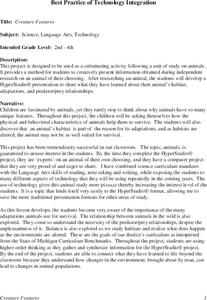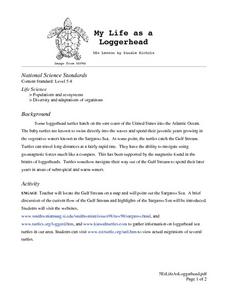Curated OER
Copycat
Fifth graders work in groups with information sheets about Monarch and Viceroy Butterflies.They create a Venn diagram to illustrate the differences and similarities between these two butterfly types. Students discuss the importance of...
Curated OER
Creature Features
Students investigate animals and how they adapt to their environment. They design a multimedia presentation that includes information about an animal of their choice. They include a title card, habitats, adaptations, and a predator/ prey...
Curated OER
Adaptations
Students are able to describe protective adaptations of animals. They are able to categorize the animals based on their protective adaptations. Students discuss adaptations of animals. They are explained that an adaptation helps an...
Curated OER
A Tail to Tell
Students observe populations of Lumbriculus to discover some of the adaptations that allow them to live successfully along the shores of ponds and marshes. They also design and perform experiments to test proposed hypotheses for these...
Curated OER
Science: Identifying Fish Parts
Students identify parts of fish and their functions. They compare the fish's body parts and purposes to their own. Working in groups, they complete worksheets by labeling fish parts on a drawing.
Curated OER
Science: Observing Fish Behavior
Fifth graders, working in pairs, select and observe fish in the Aquademics aguarium. They record their observations on worksheets and make graphs displaying the frequency of various fish behaviors. Students then discuss their...
Curated OER
Mangrove Ecology & Adaptations
Learners creat a plant, animal, or other living organism that would be well adapted to a habitat that they previously selected. First they learn about adaptations of Mangroves.
Curated OER
Mangrove Ecology and Adaptations
Students create a plant or animal that would be well adapted to a habitat they selected. They first learn about Mangroves and their specific adaptations that help them survive in their habitat.
Curated OER
Hudson Canyon Expedition; Fishy Deep Sea Designs!
Students explore the physical location of deep water habitats along the Hudson Shelf Valley and in Hudson Canyon. They study the basic characteristics of the mesopelagic and bathypelagic zones with regard to depth, temperature, pres
Curated OER
Hide and Seek
Students examine animals that use camouflage and discuss why they use it. They create drawing of an imaginary animal that uses camouflage to hide in the classroom and identify the adaptations that would allow it to hide effectively.
Curated OER
Totally Termites
Students explore the world of termites, their adaptations, and anatomy. They examine the property risks of termites and how pest control professionals manage termite problems.
Curated OER
Adding Adaptations to Insects
Fourth graders investigate elements of physical adaptation in insects and organisms. They discover how adaptations can select an insect for survival and make an insect that be used in an outdoor discovery activity.
Curated OER
Living In a Tree
Students explore the types of animals that live in trees and discuss the adaptations and characteristics that allow them to live in trees easily.
Curated OER
Candy Dish Selection
Students explore natural selection. They explore the concepts of adaptations, and the way which random factors affect the survival of individuals and populations.
Curated OER
Sharks
Students research sharks, the food chain, and the water habitat shared by humans and sharks.
Curated OER
A Long Winter's Nap
Students explore the process of estivation, hibernation and torpor and the ways that frogs adapt to seasonal weather changes.
Curated OER
Into the Sea
Students display an awareness of the diversity of species in the coral reef, their habitat and adaptations. They conduct research to find and then color code the locations of coral reefs around the world.
Curated OER
Sand, Sand, Everywhere Sand
Students study the physical characteristics of four types of desert regions. In this desert regions lesson, students watch a video about deserts and discuss the deserts. Students compare the deserts and research the ways humans have...
Curated OER
What is a Stream Habitat?
In this habitat worksheet, students fill in the blank of 3 statements describing what living things would be found in a stream habitat. This worksheet is a graphic organizer.
Curated OER
How Are Organisms Adapted to Survive?
In this organisms worksheet, students brainstorm problems that organisms have and the adaptations the organism has to survive. This worksheet is a graphic organizer.
Curated OER
Meeting Environmental Demands
Students investigate the concept of adapting to an environment. They conduct research using a variety of resources. The information search is focused upon animals picked by the students that need to be classified and then write a...
Curated OER
Who's There
Fifth graders, in groups, make a list of at least three animals that would survive well in a particular environment. After an allotted time, they pass their list to another group, where they will add to it. They discuss adaptations each...
Curated OER
My Life as a Loggerhead
Students discuss the current flow of the Gulf Stream and the characteristics of the Sargasso Sea. They visit websites to gather information on loggerhead sea turtles. Students imagine that they are newly hatched loggerhead turtles.
Curated OER
Wacky Water Critters
Students recognize the biodiversity that exists in a wetland ecosystem. They identify individual wetland organisms. Students define, identify, and comprehend the importance of adaptations. They describe the process of metamorphosis.

























